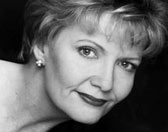Theater as Knowing Response

Lyric actors are trained in much the same way as theater artists with the added layer of music and, often, foreign language. This challenging combination requires substantial study and refinement. There is a virtual lacuna of reflective writing on this craft especially any that is integrated with faith. I entered this seminar with the hope of rejuvenating my specific training with new perspectives that would enhance and clarify what I already do in the classroom and in my own performing. I hoped to gain new ways of working that would have précis and deepen my diagnostic pedagogy.
The seminar was structured through theater games with a good balance of intellectual, kinesthetic, emotional, and spiritual elements. It began with one of the very outcomes I was hoping to gain: a new framework of questions. What would failure look/feel like in this experience? How do I know I know? What do I hope to find in this room? What are the assumptions/baggage that I bring into this room with me? What am I choosing to leave behind to enter this room? A significant set of questions for the end of a traumatic academic year.
Responding to these questions in writing was a revealing exercise. Trust was being established. Games designed to build community began simply and increased in vulnerability. Skillfully led movement and acting exercises drew participants together. Periods of rest and reflection were always welcomed and encouraged. This alone is crucial for learning to foster a “way of knowing.” As agents in God’s Kingdom we would do well to incorporate restful, contemplative reflection more.
We were empowered through a series of shared experiences such as the process of physically creating scenes (positive or negative scenes), or a sound with accompanied physical motion that we then gifted to another who would in turn transform it and re-gift it, or allowing emotional responses to scenes from a play guide a drawing exercise that would then be the basis for a new physical rendering of the same story. A telling moment occurred when we were asked to create a posture of being oppressed. Two other colleagues were asked to be the oppressors. Another was asked to observe and then be our substitute while we slipped out to view the picture, make adjustments (if needed) and then slip back into the picture. It was a powerful experience to show and view our oppression, feel a physical expression of this from others, and experience a substitutionary act (embodied—being the substitute and visual—witnessing someone else be our substitute). Our empathy markers were rising exponentially.
Another perceptible moment came when we worked with a memory shared by another colleague. We were each asked to write down a memory. These were deposited into a hat and then randomly distributed. We explored re-creating the memory through embodied sound and motion only. No pantomime or dialogue. As each of us developed our memory a few offered a “rehearsal-semi-performance.” As we transitioned out of this exercise we walked and in the fullness of time we honored the memory with which we had worked by stopping, waiting for the attention of everyone in the room, then reading it aloud. These memories were never identified but a settling sense of being known, respected, and valued was palpable. The risk and revelation of this memory work knitted the seminar together in remarkable ways.
How does this work affect my work? It gives me courage to use theater more confidently as a vehicle to illuminate and reveal truth or graciously refocus the false.
It has strengthened me to seek new ways of answering the difficult questions that face students and institutions. I left the seminar, which had begun with questions, with even more questions. What do we do when there is no invitation to the game? What if the invitation has limitations? What happens when the game fails? What if you need to drop out of the game, but there is no way back? What if you can see the game that you know you can play, but no one else can see you? More important than these questions though, was the key and motivating take away from this seminar: “Ah, yes!! A moment of epiphany!--” I have value, I am not alone, and in truth, here, there is safety. Truth will grow.
Contact Us
Center for Applied Christian Ethics
117 Blanchard Hall
501 College Ave
Wheaton, IL 60187
